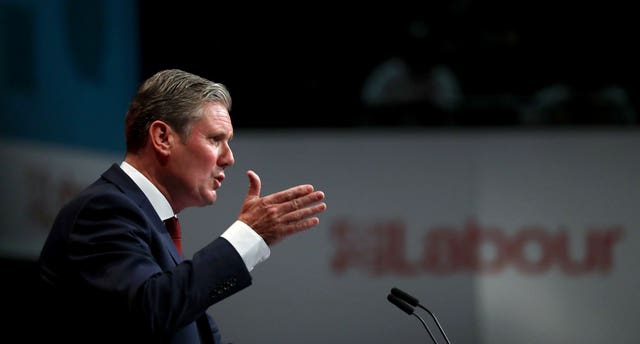Boris Johnson accused of ‘binning’ compromises as Brexit Bill returns to Commons
Assurances over workers’ rights and protections for child refugees have been struck out, according to the Prime Minister’s critics.

Boris Johnson faced accusations he had “binned” his withdrawal deal compromises in favour of a hard Brexit as MPs prepare to vote on his exit terms.
As part of his general election pledge to have Brexit “decided” by Christmas, the Prime Minister will bring back the European Union (Withdrawal Agreement) Bill for its second reading in the House of Commons on Friday.
After Mr Johnson won a landslide at the general election and secured an 80-seat majority, the vote in the afternoon is expected to pass without a hitch for the Government and lay the ground for a January exit from the EU.
The Conservative Party leader said his Brexit Bill, along with his plans for Government, announced in the Queen’s Speech on Thursday, would bring about a “new dawn” for Britain.
Mr Johnson said: “Today we will deliver on the promise we made to the people and get the Brexit vote wrapped up for Christmas.
“Now MPs will start the process of passing the Bill. Then, at the beginning of the new decade, at the beginning of a new dawn for our country, our parliamentarians will return to Westminster to immediately finish the job, take us out of the EU on January 31 and move this country forward.
“After years of delay and rancour in Parliament, we will deliver certainty and hard-working businesses and people across this country will have a firm foundation on which to plan for the future.”
But critics on the opposition benches said Mr Johnson had “binned” his pre-election compromises on protections for workers and child refugees now that he had been “unbridled” by his crushing win at the polls.
The Government, as part of a re-drafted Brexit Bill, looked to have rowed back on an original commitment to strike a deal with the EU so child refugees in Europe can continue to be reunited with their families in the UK, even after free movement ends.
Clause 37 of the Bill replaces the pledge with a watered-down vow for ministers to “make a statement” on the progress of the talks once the divorce with Brussels is complete.
Sir Keir Starmer, Labour’s shadow Brexit secretary, told the Guardian: “The Tories have torn-up the protections for workers’ rights and child refugees – and watered-down Parliament’s role in the next phase of the Brexit negotiations.

“It was a bad Bill before the election, and it is even worse now.”
Acting Liberal Democrat leader, Sir Ed Davey, added: “Barely days away from the election and this Withdrawal Agreement reveals exactly what an unbridled Boris Johnson will do with the country.
“Every compromise made before the election, from workers’ rights to protections for unaccompanied refugee children, have been binned just as we warned they would.”
Downing Street said forthcoming legislation would show the Government’s commitment to upholding rights and protections after exit day.
“Our commitment to continue the highest standards on workers’ rights, environmental standards and consumer protections will be honoured by provisions in separate legislation, including the Employment Bill announced in the Queen’s Speech,” said Number 10.
A host of other changes were made to the Brexit Bill since it was last before the Commons in October.
Mr Johnson has inserted a clause that will legally prohibit his Government from extending the transition period – the 11-month buffer during which his team will look to negotiate a trade deal with Brussels – beyond 2020.
The legal text will also boost the power of UK courts, giving judges the ability to overrule judgments made by the European Court of Justice.
If passed by MPs, the Brexit Bill will return for its final stages in both the Commons and the House of Lords in the New Year before achieving Royal Assent.
The timetable paves the way for the UK to leave the EU by the January 31 deadline and for trade talks to commence.
Prominent Tory MP Sir Bernard Jenkin said the pro-Brexit European Research Group (ERG) of Conservative backbenchers supported the PM.
He told the BBC: “Every member of the ERG supported Boris Johnson’s agreement, so we’re generally quite happy about how all this is proceeding.
“It’s a compromise deal.”
Labour MP Anneliese Dodds said she is “very concerned” about the proposed legislation.
“I really don’t feel that it’s really matching up to many of the commitments that were given by previous Conservative governments, and as a result we really have to reject that Bill.”
European Parliament vice president Pedro Silva Pereira said officials expect to conclude the ratification process in the European Parliament by January 29.
He told the BBC: “We’ve always respected the choice of the British people, but it is true that it was a very long process.”
Asked what kind of trade deal can be negotiated and how “deep” it can be if it is to be completely concluded by the end of 2020, he said: “We have a very short timeframe available.
“Eleven months to negotiate such a complex trade agreement is unprecedented. It is a different situation. We come from a level of economic integration which has no comparison with other trade agreements that we’ve done before.”





